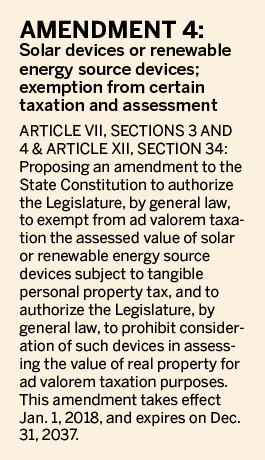- December 23, 2024
-
-
Loading

Loading


Here we go again: Another proposed constitutional amendment on Florida’s ballot that reads and sounds like Apple Pie goodness.
But that darn devil is always lurking in the details.
This is Amendment 4. If approved by 60% of voters in the Aug. 30 primary elections, it would codify in the state constitution tax breaks for having solar or renewable energy devices on all property. Specifically, the amendment would exempt solar or renewable-energy devices from the state’s tangible personal property tax and from being included in the value of the annual assessment on your property for ad-valorem tax purposes.
The big change from existing exemptions is that the tax breaks would be broadened to include not only residential but commercial properties as well.
It sounds wonderful. And what an attractive incentive to help spur wider use of solar energy in the state and to reduce Florida’s use of carbon, fossil-fuel energy. You hardly can get more green than that. Indeed, the climate changers love the idea.
As do scores of others whose inclination is to embrace any kind of tax break. Indeed, you’ll find that in addition to the support of all of the pro-solar, pro-wind energy, anti-fossil-fuel special interests, Florida business groups (i.e. more special interests) are embracing the amendment full throttle (see box below).
Who doesn’t love a tax break? And one that is environmentally friendly to boot?
But when you peel back the skin of this amendment, the sweet Apple Pie appeal actually should leave somewhat of a sour taste.
But first, the pro-propaganda. If passed, Amendment 4 will be the first step toward energy and economic utopia in Florida. At least that’s the impression the two primary proponents of the measure give you.
Those proponents, by the way, are Floridians for Solar Choice Inc., an alleged grassroots organization, and its primary financial backer, the Southern Alliance for Clean Energy (SACE). The latter is a Knoxville, Tenn.-based organization of climate-change activists that has contributed nearly $2 million of the $2.12 million Floridians for Solar Choice has received in contributions (see sidebar below) since January 2015.
With passage of Amendment 4, proponents say, residents and businesses that install solar-energy devices would benefit from lower property taxes, lower tangible taxes and lower energy bills. All good. Even better: The increase in solar power usage would mean less pollution. And to top it off, proponents say, passage of the amendment would spur the creation of solar companies and thousands of jobs in Florida for solar-panel makers, installers and maintenance technicians.

Everybody wins. Who can argue with any of that?
But as you also know: Whenever a new law is adopted, there are always — always — unintended consequences, and there are always winners and losers. This also reminds us of the famous dictum about laws from the late Nobel economist Milton Friedman: What you give to one, you must take away from another.
So let’s call this what it is: Amendment 4 is a subsidy for solar users and crony capitalism for the solar industry. It also is a regressive tax that likely will help the better off at the expense of the less well off.
Both of these consequences, however, are overshadowed by and wrapped in the environmental activists’ purity goal of reducing consumers’ use of the most economical forms of energy — fossil fuels, in favor of the most uneconomical and expensive form of energy — solar.
Think of the consequences this way: If, say, the amendment passes, and there is indeed an explosion in the installation of solar panels on residential and commercial buildings all over Florida, one of the results will be a shift in taxation.
City and county tax assessors would exempt solar devices from their assessments of residential and commercial buildings, creating a benefit (lower property taxes than they otherwise would be) for those who can afford solar panels. Those who can’t afford solar panels gradually would feel the shift of their property taxes going up so local governments can maintain their levels of tax collections and services.
Why is this amendment even needed? Why does Florida need to codify a measure that will forever favor one form of energy over another? Can you imagine a U.S. constitutional amendment giving a similar tax break?
Clearly, this is part of the political agenda of climate activists, such as those at SACE. Indeed, they would not need to tilt laws in favor of solar panels and solar devices if solar energy were economically competitive.
Here’s the reality about solar: It’s clean and renewable, yes. But …
Writing last December in “Solar Carve Outs for the Sunshine State,” James Taylor, a senior fellow at the Tallahassee-based James Madison Institute, noted a 2014 Brookings Institution study that concluded:
“Adding up the net energy cost of the five low-carbon alternatives, far and away the most expensive is solar. It costs almost 19 cents more per KWH than power from the coal or gas plants that it displaces … To place these additional costs in context, the average cost of electricity to consumers in 2012 was 9.84 cents per KWH, including the cost of transmission and distribution of electricity.”
“As a result,” the Brookings Institution added, “a new solar plant [would cost] at least 200% more [i.e., triple the cost] than using coal and gas technologies.”
Let’s also keep in mind how much solar energy is subsidized already. In addition to the property-tax exemption already given to residential solar devices in Florida, solar power equipment is exempted from sales taxes. And state power utilities and municipalities also offer solar power rebates and incentive programs. Nationwide, according to Taylor, the solar power industry in 2013 received $5.3 billion in subsidies compared to $5.1 billion in subsidies for the coal, natural gas, nuclear and oil industries combined.
What does that tell you? To be sure, every Floridian, for that matter, every American, embraces the idea of harnessing the sun’s power for energy. But at what price and at whose expense?
While Amendment 4 reads and sounds like environmental Motherhood and Apple Pie, this measure is yet another attempt by political activists to cement forever in the Florida Constitution a special benefit, to pick an energy winner over an energy loser. Solar energy, like fossil fuels, should stand on its own merit. Amendment 4 should not be in the Florida Constitution.
We recommend: No.